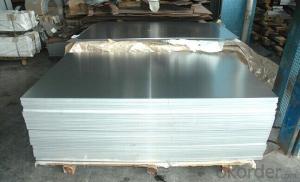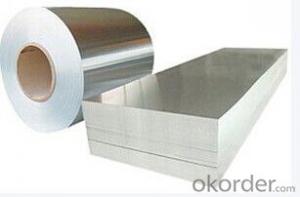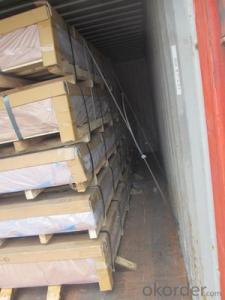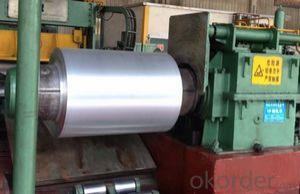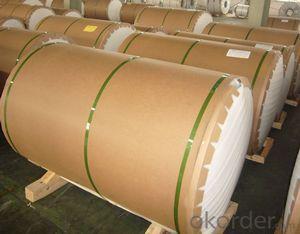AA1100 coated aluminium coil
- Loading Port:
- China Main Port
- Payment Terms:
- TT OR LC
- Min Order Qty:
- -
- Supply Capability:
- -
OKorder Service Pledge
Quality Product, Order Online Tracking, Timely Delivery
OKorder Financial Service
Credit Rating, Credit Services, Credit Purchasing
You Might Also Like
supply Mill-finished / coated aluminum plate/sheet/ coil:
Alloy: AA1050,1060,1100,1200,2024,3003,3304,3005,3015,5052,5086,5754,5083,6061,7050,7475,8011, etc
Temper: O, H14/16/18/22/24/32/ H112/H321/T6,T851,T7451,T7351, etc
Thickness: 0.02mm—20mm
Width: 100mm—2000mm (Can be slitted)
Notice: PE coating / PVDF coating / Embossment can be done if required.
- Q:How is an aluminum coil made?
- Aluminum coil rolling, a manufacturing process, is responsible for the production of aluminum coils. The process comprises multiple stages. Initially, molten aluminum is poured into large molds, resulting in the formation of large ingots or billets. These ingots are then heated to increase their malleability. After heating, the ingots are transformed into thin strips through the utilization of heavy machinery called hot rolling mills. The ingots pass through a series of rollers, gradually reducing their thickness while simultaneously increasing their length. This continuous hot rolling guarantees uniform thickness and a smooth surface finish. Following hot rolling, the aluminum strips undergo cooling and subsequent processing. Cold rolling, which involves passing the strips through cold rolling mills, is commonly employed. Cold rolling further decreases the thickness of the aluminum strips, creating the desired gauge or thickness necessary for the final product. To enhance the mechanical properties and surface finish of the aluminum, the cold-rolled coils may undergo additional treatments such as annealing, tempering, or surface treatment. Annealing includes heating the coils to a specified temperature and gradually cooling them to alleviate internal stresses and improve their ductility. Tempering is a similar process, albeit conducted at a lower temperature than annealing. Once the desired properties are achieved, the aluminum coils are typically trimmed, cut, and packaged into coils or sheets, thereby becoming ready for distribution or further fabrication. These coils find extensive use in various industries, including construction, automotive, aerospace, and packaging. Their lightweight nature, corrosion resistance, and exceptional thermal conductivity contribute to their high demand.
- Q:How are aluminum coils stored and transported?
- Aluminum coils are typically stored and transported in various ways depending on their size and weight. They are commonly stored in warehouses or outdoor storage facilities, where they are organized and stacked horizontally on pallets or racks. To ensure their protection, coils are often covered with a protective material such as plastic or shrink wrap. When it comes to transportation, aluminum coils are usually loaded onto trucks, containers, or flatbed trailers for long-distance journeys. To prevent damage during transit, the coils are secured using straps, chains, or other fastening methods. Additionally, specialized equipment like coil racks or cradles can be used to provide extra support and stability. Overall, proper storage and transportation practices are crucial to maintain the integrity of aluminum coils and prevent any potential harm.
- Q:I heard that clay pots and aluminum cans are great caves for my fish to breed in but will the can rust???
- Aluminum will not rust. Only iron rusts. Because steel has iron in it, steel can rust.
- Q:What industries commonly use aluminum coils?
- Aluminum coils are utilized by several industries due to the numerous advantageous properties they possess. The automotive industry, for instance, heavily relies on aluminum coils to manufacture components like radiators, condensers, and heat exchangers. Similarly, the construction industry utilizes aluminum coils extensively for applications such as roofing, gutters, and siding, thanks to their lightweight, corrosion-resistant, and durable characteristics. The HVAC industry also extensively employs aluminum coils to produce air handling units, heat pumps, and ductwork. The electrical industry, on the other hand, finds aluminum coils particularly suitable for transformer production due to their high electrical conductivity. Moreover, the packaging industry commonly uses aluminum coils to manufacture cans, containers, and foils. Aluminum's ability to form a protective oxide layer and its excellent heat conductivity make it especially advantageous in this field. Aerospace, marine, and transportation industries also frequently adopt aluminum coils due to their lightweight nature, which aids in enhancing fuel efficiency and overall performance. In conclusion, the versatility, durability, and exceptional physical properties of aluminum make it the preferred material choice for numerous industries that rely on aluminum coils for various applications.
- Q:Can aluminum coils be used for electrical conductors?
- Yes, aluminum coils can be used for electrical conductors. Aluminum is a highly conductive metal that is commonly used in electrical applications. It has a high electrical conductivity, second only to copper, making it a suitable material for conducting electricity. Aluminum coils are often used in various electrical devices and installations, such as transformers, motors, generators, and power transmission lines.
- Q:Can aluminum coils be used for sound insulation purposes?
- No, aluminum coils are not typically used for sound insulation purposes.
- Q:How do aluminum coils compare to fiberglass coils in terms of weight?
- Aluminum coils are generally lighter in weight compared to fiberglass coils.
- Q:If the aluminum coil is 220 kg, 0.3 thick and 500 wide, how much is the coil diameter?
- With the outer diameter and inner diameter, you can know the volume. With the density and volume, we can calculate the weight. And with weight, we can know the length.
- Q:Why is the aluminum roll upset?
- Mainly in the aluminum slitting process, for various reasons, does not meet the standards and specifications of products, can be used to roll the machine from the new trimming and slitting, winding up to meet customer needs of product specifications
- Q:What is the maximum width of aluminum coils?
- The maximum width of aluminum coils can vary depending on various factors such as the manufacturing process, the specific grade and type of aluminum, and the capabilities of the equipment being used. However, in general, aluminum coils can have a maximum width ranging from a few inches to several feet. Industrial coil lines can typically handle widths up to 72 inches, while specialized equipment may be able to accommodate even wider coils. It is important to consult with the manufacturer or supplier to determine the specific maximum width available for a particular application.
1. Manufacturer Overview |
|
|---|---|
| Location | |
| Year Established | |
| Annual Output Value | |
| Main Markets | |
| Company Certifications | |
2. Manufacturer Certificates |
|
|---|---|
| a) Certification Name | |
| Range | |
| Reference | |
| Validity Period | |
3. Manufacturer Capability |
|
|---|---|
| a)Trade Capacity | |
| Nearest Port | |
| Export Percentage | |
| No.of Employees in Trade Department | |
| Language Spoken: | |
| b)Factory Information | |
| Factory Size: | |
| No. of Production Lines | |
| Contract Manufacturing | |
| Product Price Range | |
Send your message to us
AA1100 coated aluminium coil
- Loading Port:
- China Main Port
- Payment Terms:
- TT OR LC
- Min Order Qty:
- -
- Supply Capability:
- -
OKorder Service Pledge
Quality Product, Order Online Tracking, Timely Delivery
OKorder Financial Service
Credit Rating, Credit Services, Credit Purchasing
Similar products
New products
Hot products
Related keywords
